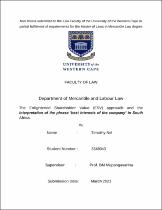| dc.contributor.advisor | Mupangavanhu, Brighton | |
| dc.contributor.author | Nel, Timothy | |
| dc.date.accessioned | 2023-08-10T08:02:09Z | |
| dc.date.available | 2023-08-10T08:02:09Z | |
| dc.date.issued | 2023 | |
| dc.identifier.uri | http://hdl.handle.net/11394/10458 | |
| dc.description | Magister Legum - LLM | en_US |
| dc.description.abstract | According to section 76(3)(b) of the Companies Act 71 of 2008, directors are obligated to incorporate the company's best interests in their objectives. Generally, this phrase denotes the interests of the shareholders collectively.1 It has been difficult to establish what exactly the term ‘company’ means. The phrase 'best interests of the company' has similarly been difficult to explain. Currently, the efforts to provide answers are represented by three approaches, viz (i) the shareholder value approach, (ii) the pluralist/stakeholder approach and (iii) the enlightened shareholder-value (ESV) approach. While some authors may be convinced that South Africa has adopted the ESV approach under the Companies Act 71 of 2008, the phrase ‘best interests of the company’ requires further unpacking to determine its exact meaning.2 | en_US |
| dc.language.iso | en | en_US |
| dc.publisher | University of the Western Cape | en_US |
| dc.subject | Corporate governance | en_US |
| dc.subject | Corporate citizenship | en_US |
| dc.subject | Labour law | en_US |
| dc.subject | South Africa | en_US |
| dc.subject | Section 76(3)(b) of the Companies Act 71 of 2008 | en_US |
| dc.title | The enlightened shareholder value (esv) approach and the interpretation of the phrase ‘best interests of the company’ in South Africa | en_US |
| dc.rights.holder | University of the Western Cape | en_US |

